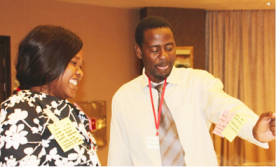How can climate science inform decision-making in Zambia?
How can climate science inform decision-making in Zambia?
Bettina Koelle of Red Cross Red Crescent Climate Centre explores how climate science, despite its complexity and elements of uncertainty, can inform decision-making in Zambia.
Climate extremes are already posing many challenges to people living in Zambia: droughts affect farmers and their livelihoods, heavy rainfall events lead to flooding in urban areas and bring hardship to people living in exposed areas in Lusaka, and high temperatures are affecting industries and water demands. Government and planning processes aim to respond to these challenges in the present day, but it is also important to consider what the effects of climate change will be in the medium term 5-40 years from now, and to plan for them.
Climate scientists project that the already observed warming trend in Zambia will continue in the next 40 years. It’s highly likely that the country will also observe an overall drying trend. At the same time, more extreme rain events might occur. This will have far reaching implications for Zambians and will affect people's lives and livelihoods.
While these challenges are growing more urgent in Zambia today, it is crucial to plan for a changing future - and to understand how we can take decisions today that will allow us to be prepared for what we will experience in the medium term.
In 2014, as part of the Future Climate for Africa (FCFA) programme (funded by DFID and NERC), a series of interactive workshops and a high level breakfast meeting were facilitated by the Red Cross Red Crescent Climate Centre, in close collaboration with the Zambian Red Cross and the UK based Met Office Hadley Centre. This process gathered a range of stakeholders from different sectors, NGO, government departments and academia to explore how climate science could support more robust medium-term decision-making in Zambia. The process was also supported by primary and secondary research on climate science to draw on current knowledge and identify gaps.
Workshop participants explored real-life issues such as flood-proof storage for agricultural products or ways of transport being affected by extreme rainfall, and identified critical limits for certain climatic events also called thresholds. These were then linked to existing climate information, and finally participants considered development alternatives for a range of examples from different sectors.
[caption id="attachment_44370" align="alignleft" width="276"] Interactive approaches can stimulate more integrated thinking and help exploring complex situations and uncertainty: workshop participants in an interactive networking session (Photo: Bettina Koelle, Climate Centre)[/caption]
Interactive approaches can stimulate more integrated thinking and help exploring complex situations and uncertainty: workshop participants in an interactive networking session (Photo: Bettina Koelle, Climate Centre)[/caption]
The overall process resulted in a series of key findings for the way forward:
- It is important to understand complex systems and feedback loops. Feedback loops can re-inforce negative effects such as flooding of a solid waste area impacting on well-being of local residents. Only once these systems are better understood, can long-term climate science be integrated in medium-term decision making processes.
- We need reliable scientific climate information that is tailored to decision makers adaptation needs and allows them to make better decisions.
- Developing and implementing interactive approaches to learning and dialogue can help collaboration and communication across disciplines and sectors and help partners in complex decision making.
- Creating information pathways between vulnerable communities, decision-makers and researchers can build confidence and increase engagement of local experts.
- Identifying vulnerability thresholds (e.g. 3 consecutive days with extreme rainfall of more than 900mm was identifid as a threshold for urban flooding, meaning that once this limit would have been exceeded, urban flooding would occur) and linking these to climate information can support climate-smart resource allocation and risk management at various timescales.
- Environmental monitoring and data sharing can support adaptation decision-making under uncertainty while considering existing trends.
The FCFA pilot teams worked in various African countries and converged in Cape Town for a joint workshop to analyse the overall findings. The next phase of the FCFA process will consider these lessons learnt for the upcoming projects funded under FCFA II.
To learn more about FCFA:
CDKN and the FCFA scoping phase
